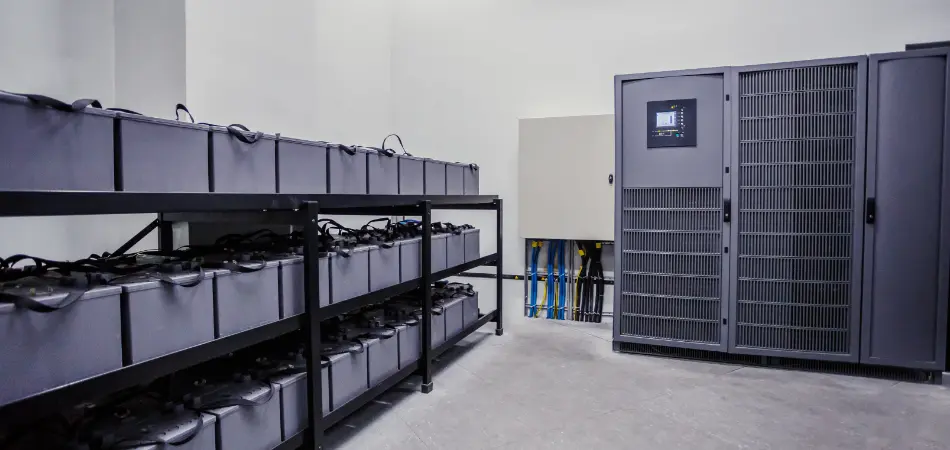How Long Do UPS Batteries Last? Signs You Need a Replacement

UPS systems bridge the gap when the primary power supply fails, giving you time to save work, shut down equipment safely, or keep essential devices running.
The batteries, usually sealed lead-acid (SLA) or lithium-ion types, are at the heart of these systems. They store the energy that powers your devices during an outage.
Without a reliable battery, even the most advanced UPS system won’t deliver the protection you need.
Typical Lifespan of UPS Batteries
Most UPS batteries last 3 to 5 years under normal conditions. However, several factors can influence this range, including:
1. Usage
- Frequent discharges and recharges shorten the battery’s lifespan.
- Heavy loads drain the battery faster, leading to quicker degradation.
2. Environmental Conditions
- High temperatures, especially above 77°F (25°C), accelerate battery wear.
- Humid or dusty environments can corrode battery components.
3. Battery Quality
- Higher-quality batteries typically last longer.
- Cheaper, no-name brands might save money upfront, but often require faster replacement.
4. Maintenance
- Proper care, including regular testing and voltage checks, extends lifespan.
- Ignoring maintenance can invite premature failure.
Signs You Need a Replacement
1. Shortened Backup Time
- If your UPS can’t provide sufficient backup during an outage, it may have declining battery capacity.
- Test by unplugging your UPS to simulate a power loss and see how long it runs.
2. Warning Alarms or Indicators
- Most modern UPS systems have built-in alarms or flashing lights to signal battery issues.
- Frequent alerts or errors, such as “Replace Battery” warnings, should not be ignored (any more than the “Check Engine” light in your car.
3. Physical Changes
- Bulging or leaking batteries indicate overheating and chemical degradation.
- Discoloration or corrosion around terminals points to advanced wear.
4. Unexpected Shutdowns
- If your UPS powers off suddenly during outages, its batteries may have failed.
5. Age of the Battery
- Even if no obvious signs are present, any battery older than 3–5 years should be tested and considered for replacement.
Tips to Extend the Life of Your UPS Battery
1. Maintain Optimal Temperature
- Keep the UPS in a cool, well-ventilated area.
- Avoid placing it near heat sources like appliances or direct sunlight.
2. Perform Regular Testing
- Schedule battery checks monthly or quarterly, depending on usage demands.
- Use “self-test” features in most UPS models to evaluate performance.
3. Avoid Overloading
- Ensure the UPS isn’t running at maximum capacity for extended periods.
- Carefully match your devices’ power requirements to the UPS rating.
4. Replace Old Batteries Promptly
- Stay proactive and replace batteries before they fail outright.
- Consider keeping a spare battery, especially for mission-critical setups.
5. Store Properly
- If the UPS isn’t in use, store it in a dry environment away from extreme temperatures.
- For long-term storage, partially charge the battery and disconnect it to prevent over-discharge.
FAQs: Monitoring Your UPS Batteries
Q: How do I know if my UPS battery is dead?
If your UPS no longer provides backup power, frequently alarms, or displays a “Replace Battery” warning, it may have given up the ghost.
Q: Can I replace a UPS battery myself?
Most UPS systems allow user replacement. Always follow the manufacturer’s safety instructions.
Q: What’s the difference between SLA and lithium-ion UPS batteries?
SLA batteries are more common and cost-effective, but have shorter lifespans. Lithium-ion batteries last longer, but are more expensive upfront.
Q: How often should I test my UPS battery?
Every 11–3 months, depending on how critical it is.
Q: Can UPS batteries explode?
This is rare but possible if the battery is overcharged, damaged, or exposed to extreme heat.
Q: Does overloading the UPS damage the battery?
Yes, overloading accelerates wear and decreases battery life.
Q: What’s the best way to dispose of old UPS batteries?
Recycle them through a certified battery recycling center to ensure safe and eco-friendly disposal.
Q: Are larger UPS batteries always better?
Not necessarily. The right size depends on your power requirements. Oversizing without a need is inefficient.
More Articles

0 Comments